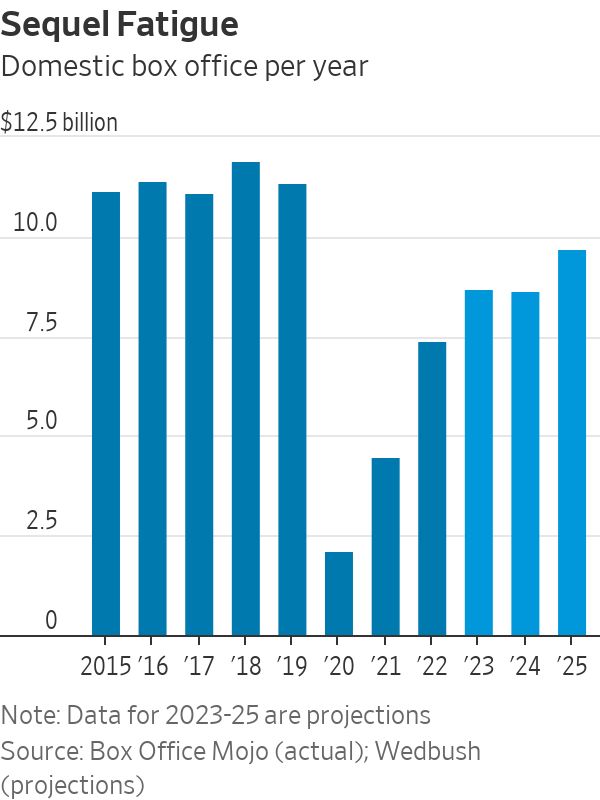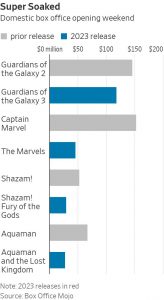2023 may be over, but Hollywood’s painful reckoning isn’t—especially at the box office.
This year’s holiday season has largely been a lump of coal for the movie industry. Domestic box office receipts for the season starting the first week of November have barely crossed the $1 billion mark. That is actually below the same period in each of the past two years, which had been helped by the release of mega-blockbusters like “Avatar: The Way of Water” and “Spider-Man: No Way Home.” It is also less than half the $2.3 billion average for the holiday season in the prepandemic years of 2015 to 2019, according to Box Office Mojo.

There are a few reasons. The Hollywood labor strikes that shuttered productions from May through mid-November resulted in several big releases being shifted out of the latter half of 2023. And the once-bankable superhero genre has been slipping, with the waterlogged performance of “Aquaman and the Lost Kingdom” being just the latest example. The movie grossed just $27.7 million on its Dec. 22 opening weekend—less than half of its 2018 predecessor and the fourth consecutive movie in Warner Bros. Discovery’s DC franchise to make a disappointing debut.
That came just weeks after Disney’s “The Marvels” scored the weakest opening ever for the Marvel franchise. And it hasn’t improved with age; “The Marvels” now has barely passed the $205 million mark globally after nearly two months in theaters. No Marvel movie has ended its theatrical run with a global box-office gross of less than $370 million since Disney acquired the studio in 2009, according to the movie industry tracking site The Numbers.
The year wasn’t all misfires. Moviegoers turned out for familiar brands like “Barbie” and “Super Mario” that have so far gone untapped by Hollywood, while the surprising success of the three-hour “Oppenheimer” biopic shows challenging material can also find an audience. Still, the weakening of two superhero franchises that together have generated more than $36 billion at the global box office makes a noticeable dent. With less than a week remaining in the year, 2023’s domestic box office total is a little over $8.7 billion, up 18% from the previous year but 23% below 2019’s total, according to Box Office Mojo.

That isn’t a great sign for an industry still recovering from the disruptions of the pandemic and the booming growth of streaming. The aftermath of the labor strikes will also last well into the new year. Several analysts now expect 2024’s domestic box office to be lower than 2023’s, given the changes to the release schedule that also resulted in some 2024 films being pushed out to the following year.
And much of the 2024 schedule is still unclear. In a Dec. 18 report, Morgan Stanley analyst Benjamin Swinburne projected that 30 wide-release films will be added to the 2024 schedule during the first half of the year. “In our view, it is up to film supply to match theatrical demand for box office revenues to converge toward prepandemic levels,” he wrote.
That has Wall Street already looking toward 2025 for things to finally improve for the industry. Alicia Reese of Wedbush projects the domestic box office will reach about $9.7 billion in 2025, up 12% from 2024 and about 15% below the prepandemic average of about $11.3 billion annually. Consensus estimates for theater chains Cinemark and AMC Entertainment reflect a similar trend—a drop in admissions revenue in 2024 followed by double-digit growth in 2025.
Swinburne thinks the industry can return to something close to pre-Covid levels in 2026, though he acknowledges that much remains unknown about the release pipeline that far out. Given the two- to three-year turnaround time for most big-budget movies, 2026 would be the first year to see how well Hollywood has absorbed the brutal lessons of 2023. Hopefully, “Barbie” won’t be on her fourth sequel by then.
Write to Dan Gallagher at dan.gallagher@wsj.com



